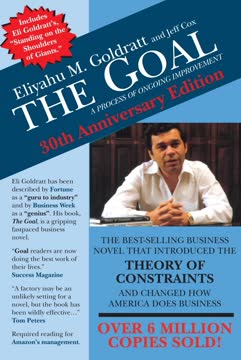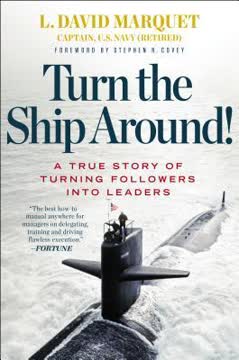نکات کلیدی
1. سبک مدیریت فعلی بزرگترین تولیدکنندهی اتلاف است
سبک مدیریت فعلی بزرگترین تولیدکنندهی اتلاف است و باعث زیانهای عظیمی میشود که اندازهگیری و ارزیابی آنها ممکن نیست.
روشهای مضر. بسیاری از روشهای مدیریتی رایج در واقع بهرهوری و کیفیت را مختل میکنند:
- رتبهبندی کارکنان و تیمها
- مدیریت بر اساس اهداف عددی
- تمرکز بر تفکر کوتاهمدت
- اتکا به بازرسی برای بهبود کیفیت
- تغییر مداوم اولویتها و ابتکارات
رویکردهای بهتر. در عوض، سازمانها باید:
- بر بهینهسازی کل سیستم تمرکز کنند
- ثبات هدف را فراهم کنند
- در بهبود بلندمدت سرمایهگذاری کنند
- کیفیت را از ابتدا در فرآیندها ایجاد کنند
- همکاری را به جای رقابت داخلی تقویت کنند
2. یک سیستم باید هدف داشته باشد و به صورت کلی مدیریت شود
یک سیستم باید هدف داشته باشد. بدون هدف، سیستمی وجود ندارد.
تعریف سیستم. یک سیستم شبکهای از اجزای وابسته به هم است که به سوی یک هدف مشترک کار میکنند. جنبههای کلیدی:
- هدف باید برای همه واضح باشد
- اجزا باید همکاری کنند، نه رقابت
- کل سیستم را بهینهسازی کنید، نه بخشهای فردی
نقش مدیریت. رهبران باید:
- هدف سیستم را روشن و ابلاغ کنند
- تعاملات بین اجزا را مدیریت کنند
- در صورت نیاز مرزهای سیستم را گسترش دهند
- تصمیمگیریها را با در نظر گرفتن کل سیستم انجام دهند
3. دانش عمیق برای تحول مدیریت ضروری است
اولین گام تحول فردی است. این تحول ناپیوسته است و از درک سیستم دانش عمیق ناشی میشود.
چهار مؤلفه. سیستم دانش عمیق دمینگ شامل:
- قدردانی از یک سیستم
- دانش دربارهی تغییرات
- نظریهی دانش
- روانشناسی
اجزای مرتبط. این عناصر به هم مرتبط هستند و باید با هم درک شوند. برای مثال:
- روانشناسی نشان میدهد چگونه افراد را در یک سیستم رهبری کنیم
- دانش تغییرات کمک میکند تا علل عمومی و خاص را تشخیص دهیم
- نظریهی دانش راهنمای یادگیری و بهبود مستمر است
4. رهبری کلید تحول سازمانی است
وظیفهی یک رهبر انجام تحول در سازمان خود است. او دارای دانش، شخصیت و قدرت اقناع است.
نقش رهبر. رهبران مؤثر باید:
- نیاز به تحول را درک و ابلاغ کنند
- دیدگاه و برنامهی واضحی برای تغییر داشته باشند
- دانش عمیقی از سیستمها و نظریهی مدیریت داشته باشند
- قدرت اقناع برای همراه کردن دیگران را نشان دهند
فرآیند تغییر. تحول نیازمند:
- تغییر فردی در تفکر، از رهبران شروع میشود
- ابلاغ واضح فلسفهی جدید در سراسر سازمان
- صبر و پایداری برای غلبه بر مقاومت
- یادگیری و تنظیم مداوم رویکرد
5. مدیریت افراد نیازمند درک تغییرات و روانشناسی است
یک مدیر افراد میفهمد که افراد با یکدیگر متفاوت هستند. او سعی میکند برای همه علاقه و چالش و شادی در کار ایجاد کند.
درک تغییرات. مدیران باید:
- بین علل عمومی و خاص تغییرات تمایز قائل شوند
- از واکنش به هر نوسان به عنوان یک مسئله مهم خودداری کنند
- از دادهها و روشهای آماری برای درک فرآیندها استفاده کنند
بینشهای روانشناسی. مدیریت مؤثر افراد شامل:
- شناخت تفاوتها و نقاط قوت فردی
- ایجاد شرایط برای انگیزهی درونی
- تقویت همکاری به جای رقابت
- حذف ترس و تشویق به نوآوری
6. کیفیت و بهرهوری با هم از طریق تفکر سیستمی بهبود مییابند
بهبود کیفیت کل خط تولید را در بر میگیرد، از مواد ورودی تا مصرفکننده، و طراحی مجدد محصول و خدمات برای آینده.
ارتباط کیفیت-بهرهوری. برخلاف باور عمومی:
- بهبود کیفیت هزینهها را کاهش میدهد
- کیفیت بالاتر منجر به بهرهوری بالاتر میشود
- ابتدا بر کیفیت تمرکز کنید، سپس بهرهوری به دنبال آن خواهد آمد
رویکرد سیستمی. برای بهبود کیفیت:
- به کل جریان ارزش نگاه کنید
- تأمینکنندگان و مشتریان را درگیر کنید
- محصولات و فرآیندها را به طور مداوم طراحی مجدد کنید
- همکاری را در تمام بخشها تقویت کنید
7. بهبود مستمر از طریق بهکارگیری روش علمی حاصل میشود
یک نمودار جریان برای یادگیری و بهبود یک محصول یا فرآیند.
چرخه PDSA. چرخه برنامهریزی-اجرا-مطالعه-عمل کلیدی است:
- برنامهریزی: توسعه یک نظریه برای بهبود
- اجرا: انجام یک آزمایش کوچکمقیاس
- مطالعه: تحلیل نتایج
- عمل: پذیرش، رها کردن یا اصلاح تغییر
تفکر علمی. این رویکرد:
- یادگیری از طریق آزمایش را تشویق میکند
- خطر شکستهای بزرگمقیاس را کاهش میدهد
- تصمیمگیری مبتنی بر داده را ترویج میکند
- فرهنگ بهبود مستمر را پرورش میدهد
8. رقابت درون سازمانی مخرب است؛ همکاری کلیدی است
هدف هر کسی، تحت سیستم شایستگی، راضی کردن رئیس است. نتیجه تخریب روحیه است. کیفیت آسیب میبیند.
مشکلات رقابت داخلی:
- همکاری و اشتراک اطلاعات را تضعیف میکند
- تفکر کوتاهمدت و دستکاری معیارها را تشویق میکند
- برندگان و بازندگان ایجاد میکند و روحیه را آسیب میزند
مزایای همکاری:
- تلاشها را به سوی اهداف مشترک سازمانی همسو میکند
- یادگیری و اشتراک بهترین روشها را ترویج میکند
- عملکرد کلی سیستم را بهبود میبخشد
- رضایت شغلی و مشارکت را افزایش میدهد
9. تمرکز بر تفکر بلندمدت و ثبات هدف
البته، مدیریت باید بر مشکلات کوتاهمدت کار کند. اما کار کردن صرفاً بر مشکلات کوتاهمدت، فقط خاموش کردن آتش است.
تمرکز بلندمدت. سازمانها باید:
- یک دیدگاه بلندمدت واضح را توسعه و ابلاغ کنند
- در تحقیق، نوآوری و توسعه کارکنان سرمایهگذاری کنند
- تصمیمگیریها را با در نظر گرفتن تأثیرات آینده انجام دهند، نه فقط نتایج فوری
ثبات هدف. این شامل:
- حفظ تعهد به دیدگاه علیرغم موانع
- مقاومت در برابر فشار برای دستاوردهای کوتاهمدت به هزینه بلندمدت
- آموزش مداوم ذینفعان درباره اهمیت دیدگاه بلندمدت
10. حذف مدیریت بر اساس اهداف عددی و سهمیهها
یک هدف عددی هیچ کاری انجام نمیدهد. فقط روش مهم است، نه هدف.
مشکلات اهداف عددی:
- دستکاری و تفکر کوتاهمدت را تشویق میکند
- قابلیت سیستم و تغییرات را نادیده میگیرد
- ترس ایجاد میکند و نوآوری را دلسرد میکند
رویکردهای بهتر:
- بر بهبود روشها و فرآیندها تمرکز کنید
- از دادهها برای درک قابلیت سیستم استفاده کنید
- اهدافی برای بهبود مستمر تعیین کنید، نه اهداف ثابت
- آزمایش و یادگیری را تشویق کنید
11. ترس را از بین ببرید و انگیزه درونی را در محیط کار ایجاد کنید
هیچکس نمیتواند از کار خود لذت ببرد اگر با دیگران مقایسه شود.
تأثیرات منفی ترس:
- نوآوری و ریسکپذیری را سرکوب میکند
- تشویق به پنهان کردن مشکلات
- ارتباط و کار تیمی را آسیب میزند
- رضایت شغلی و مشارکت را کاهش میدهد
ایجاد انگیزه درونی:
- محیطی امن برای اشتراک ایدهها و نگرانیها ایجاد کنید
- فرصتهایی برای یادگیری و رشد فراهم کنید
- نقاط قوت فردی را بشناسید و استفاده کنید
- کار را به هدفی معنادار متصل کنید
- رتبهبندی عملکرد سالانه و پرداخت بر اساس شایستگی را حذف کنید
آخرین بهروزرسانی::
FAQ
What is "The New Economics for Industry, Government, Education" by W. Edwards Deming about?
- Management transformation focus: The book advocates for a fundamental transformation in the prevailing style of management across industry, government, and education.
- System of Profound Knowledge: Deming introduces a holistic framework composed of systems thinking, knowledge of variation, psychology, and theory of knowledge.
- Application across sectors: The principles are designed to optimize organizations by fostering cooperation, long-term thinking, and continual improvement.
Why should I read "The New Economics for Industry, Government, Education" by W. Edwards Deming?
- Timeless and practical insights: The book remains highly relevant for leaders seeking to address persistent management and quality challenges.
- Transformational impact: Deming’s philosophy has revolutionized industries worldwide, especially in Japan, and continues to influence modern management.
- Actionable guidance: Readers gain both a philosophical foundation and practical tools for organizational transformation and sustainable success.
What are the key takeaways from "The New Economics for Industry, Government, Education" by W. Edwards Deming?
- Prevailing management causes losses: Short-term thinking, competition, and mismanagement lead to significant, often hidden, organizational losses.
- System thinking is essential: Organizations must be managed as interconnected systems with clear aims and cooperative components.
- Leadership and people management: Effective leadership, respect for individual differences, and intrinsic motivation are crucial for organizational joy and performance.
What is Deming’s "System of Profound Knowledge" and how does it underpin his management philosophy?
- Four interrelated components: The system includes appreciation for a system, knowledge about variation, theory of knowledge, and psychology.
- Holistic transformation framework: These elements interact and provide a comprehensive lens for understanding and improving organizations.
- Foundation for improvement: The System of Profound Knowledge guides leaders in making better decisions and optimizing organizational performance.
How does W. Edwards Deming define a "system" in "The New Economics"?
- Network of interdependent components: A system is a group of parts working together toward a common aim, which must be clearly defined.
- Management’s role: Systems require active management to direct efforts, prevent destructive competition, and ensure cooperation.
- Broad boundaries: The system can include suppliers, customers, competitors, and the environment, emphasizing mutual benefit.
What are common management mistakes highlighted by Deming in "The New Economics"?
- Short-term focus: Overemphasis on immediate results and visible numbers undermines long-term optimization.
- Ranking and competition: Merit systems and incentive pay foster unhealthy competition and demoralize employees.
- Ignoring system interdependence: Treating components as isolated profit centers destroys overall system effectiveness.
How does Deming address quality management in "The New Economics for Industry, Government, Education"?
- Quality is management’s responsibility: Top management must design and optimize systems to ensure quality.
- Beyond zero defects: Eliminating defects is not enough; innovation, style, and performance improvements are also necessary.
- Quality as a system outcome: Achieving quality requires cooperation and continuous improvement across the entire organization.
What is the significance of the "Red Beads" experiment in Deming’s "The New Economics"?
- Demonstrates system-driven performance: The experiment shows that most variation in output is due to the system, not individual effort.
- Challenges merit and ranking systems: It illustrates the futility of rewarding or punishing workers for outcomes beyond their control.
- Teaches about variation: The Red Beads experiment is a practical tool for understanding variation and the importance of system optimization.
What is the difference between common causes and special causes of variation according to Deming?
- Common causes: These are inherent, stable sources of variation within a process and require systemic improvement.
- Special causes: These are unusual, assignable events that disrupt process stability and need specific investigation.
- Management implications: Misinterpreting these causes leads to costly mistakes, such as tampering or ignoring real problems.
How do control charts work and why are they important in Deming’s management philosophy?
- Visualizing variation: Control charts plot process data over time to distinguish between common and special causes of variation.
- Predictive tool: When a process is in control, future performance becomes predictable, aiding planning and improvement.
- Avoiding costly mistakes: Control charts help managers avoid overreacting to normal variation or missing real issues, improving quality and reducing costs.
What are Deming’s views on merit pay, performance appraisals, and incentives in "The New Economics"?
- Merit pay is demoralizing: Rewarding or punishing workers for system-driven variation undermines morale and cooperation.
- Performance appraisals are flawed: Focusing on visible numbers and individual blame ignores systemic causes and reduces intrinsic motivation.
- Recommended alternatives: Deming advocates for mentoring, process improvement, and fostering cooperation over competition.
How can organizations start implementing Deming’s ideas from "The New Economics for Industry, Government, Education"?
- Stop harmful practices: Cease tampering, merit pay, and managing solely by visible numbers.
- Introduce control charts: Use them to understand and manage variation in processes.
- Adopt PDSA cycles: Employ Plan-Do-Study-Act cycles for iterative, low-risk improvement and commit to ongoing learning and cooperation.
نقد و بررسی
کتاب اقتصاد نوین عمدتاً با نقدهای مثبت روبهرو شده و به خاطر ایدههای عمیقش در زمینهی تفکر سیستمی، مدیریت و کنترل کیفیت مورد تحسین قرار گرفته است. خوانندگان به تمرکز دمنگ بر همکاری به جای رقابت و انتقاد او از شیوههای سنتی مدیریت ارج مینهند. بسیاری از افراد مفاهیم این کتاب را هنوز هم در دنیای امروز مرتبط میدانند، هرچند برخی به مثالهای قدیمی و سبک نوشتاری نامنظم آن انتقاد میکنند. در حالی که برخی از خوانندگان با محتوای فشردهی کتاب مشکل دارند، دیگران آن را خواندنی تحولآفرین برای درک دینامیکهای سازمانی و اصول رهبری میدانند.
Similar Books
















